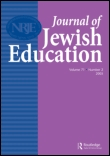
Journal of Jewish Education
Scope & Guideline
Illuminating the intersection of culture and education in Jewish studies.
Introduction
Aims and Scopes
- Cultural Identity and Jewish Education:
The journal emphasizes the interplay between Jewish education and cultural identity, exploring how educational practices shape and are shaped by cultural contexts, especially among diverse Jewish communities. - Innovative Pedagogies:
There is a strong focus on innovative pedagogical approaches within Jewish education, including constructivist, multicultural, and arts-based methodologies that encourage engagement and critical thinking. - Social Justice and Community Engagement:
The journal highlights themes of social justice, community engagement, and the ethical dimensions of Jewish education, reflecting on how education can serve as a tool for social change and community building. - Research on Educational Practices:
A commitment to empirical research on Jewish educational practices is evident, with studies examining the effectiveness and implications of various teaching methods and curricular designs. - Interdisciplinary Approaches:
The journal supports interdisciplinary research, integrating insights from fields such as psychology, sociology, and cultural studies to enrich the discourse around Jewish education.
Trending and Emerging
- Integration of Technology in Education:
There is an increasing focus on the role of technology in Jewish education, particularly in the context of online learning and digital resources, which have become essential in light of recent global events. - Focus on Mental Health and Well-Being:
Themes around mental health and positive psychology have gained prominence, emphasizing the importance of emotional well-being in educational settings and its impact on student learning. - Diversity and Inclusion:
Emerging discussions around diversity, equity, and inclusion within Jewish educational contexts reflect a broader societal shift, with educators seeking to address varied cultural identities and experiences. - Critical Pedagogy and Social Justice:
There is a growing trend towards critical pedagogy that incorporates social justice themes, encouraging educators to reflect on their practices and the societal implications of Jewish education. - Interdisciplinary Connections:
Recent publications show an increasing trend towards interdisciplinary approaches, linking Jewish education with broader educational theories and practices from various fields.
Declining or Waning
- Traditional Approaches to Jewish Education:
There appears to be a waning interest in strictly traditional methods of Jewish education, as more innovative and inclusive pedagogies gain traction in contemporary discourse. - Historical Perspectives:
While historical analysis remains important, the frequency of papers focusing solely on historical aspects of Jewish education has decreased, suggesting a shift towards more current and practical applications. - Homogeneity in Jewish Educational Experience:
The journal has seen a decline in articles that address a singular or homogeneous Jewish educational experience, reflecting a growing recognition of diversity and the need for inclusive approaches.
Similar Journals

Journal for Multicultural Education
Celebrating diversity in learning and teaching.Welcome to the Journal for Multicultural Education, an esteemed publication by Emerald Group Publishing Ltd, dedicated to advancing knowledge and practice in the dynamic fields of Cultural Studies, Education, and Linguistics. Since its inception in 2014, this journal has established itself as a leading forum for research, reflection, and discourse, addressing the multifaceted experiences of diverse cultures in educational contexts. With a commendable Scopus Rank placing it in the 87th percentile for Cultural Studies, the journal is positioned in the Q1 quartile, making it a premier outlet for scholars and practitioners looking to contribute to and engage with cutting-edge research. Our commitment to fostering an inclusive dialogue on multicultural education equips our readers with innovative strategies and insights essential for navigating today’s globalized society. While the journal operates under standard access provisions, we invite researchers, educators, and students alike to explore the rich tapestry of scholarly works published within these pages, and partake in a vibrant community dedicated to transformative education.
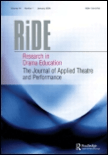
RIDE-The Journal of Applied Theatre and Performance
Navigating the Boundaries of Theatre and EducationRIDE - The Journal of Applied Theatre and Performance is an esteemed academic publication dedicated to exploring the multifaceted relationships between theatre, performance, and applied practices. Published by Routledge Journals, Taylor & Francis Ltd, this journal serves as a vital resource for scholars, practitioners, and students in the fields of education, literature, and the visual and performing arts. With a commendable 2023 Impact Factor indicating its significance in the arts and humanities, RIDE ranks in the top quartiles (Q1 and Q3) across various categories, including Literature and Literary Theory, and Visual Arts and Performing Arts. This rigorous journal encompasses a broad range of topics such as transformative learning through performance, the role of theatre in social change, and innovative pedagogical strategies. While not open access, RIDE provides valuable insights and research that are crucial for advancing the understanding and practice of applied theatre and performance. With its extensive scope and compelling content, RIDE stands as a cornerstone for those interested in the dynamic intersections of art, education, and society, continuing to publish impactful research from 2010 to 2024 and beyond.
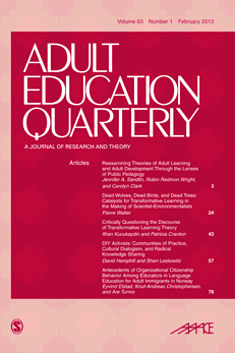
ADULT EDUCATION QUARTERLY
Connecting Theory and Practice in Adult LearningADULT EDUCATION QUARTERLY, published by SAGE PUBLICATIONS INC, stands as a premier scholarly outlet in the field of adult education and lifelong learning, with a distinguished history dating back to 1950. Holding a notable Q2 ranking in both Education and E-learning categories as of 2023, this journal serves as a vital resource for researchers and practitioners alike, offering deep insights into contemporary issues, theoretical frameworks, and empirical studies related to adult learning. The journal's impressive Scopus ranking places it in the 67th percentile of Social Sciences Education, reflecting its impact and relevance within the academic community. Although not an open-access journal, ADULT EDUCATION QUARTERLY ensures that it maintains high academic standards and contributes to meaningful discourse in the field. With a commitment to fostering a better understanding of adult education practices and promoting innovative learning models, this journal plays a critical role in advancing knowledge and shaping the future of education for adults globally.

International Journal of Multicultural Education
Empowering educators through culturally responsive research.The International Journal of Multicultural Education (IJME), published by EASTERN COLL, DEPT EDUCATION, is a leading open-access journal dedicated to advancing the field of multicultural education. Established in 2007, this journal has become an essential platform for researchers, educators, and policymakers interested in exploring the complexities of education in diverse cultural contexts. With an impressive impact factor and strong rankings in multiple categories including Q1 in Anthropology and Cultural Studies, and Q2 in both Education and Social Sciences, the IJME provides high-quality, peer-reviewed articles that contribute to impactful educational practices and scholarship. The journal's open access model ensures that its invaluable research reaches a global audience, fostering dialogue and collaboration among academics, practitioners, and students. By focusing on themes that address social justice, equity, and cultural awareness in education, the IJME plays a critical role in shaping inclusive and effective educational frameworks for the future.
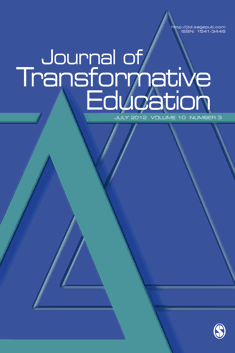
Journal of Transformative Education
Elevating Educational Discourse for Meaningful ChangeJournal of Transformative Education, published by SAGE PUBLICATIONS INC, stands as a pivotal resource within the field of education, dedicated to fostering innovation and positive change in educational practices. Established in 2003 and continuing through to 2024, this journal boasts an impressive range of contributions that are crucial for academics, policymakers, and practitioners focusing on transformative learning processes. With a current classification in the Q3 quartile for education in 2023 and a respectable Scopus ranking of 730 out of 1543, this journal provides a platform for high-quality research and discourse. Although it is not an open-access journal, its findings are invaluable for those seeking to enhance educational methodologies and learner engagement. The Journal of Transformative Education is a must-read for anyone interested in the evolving landscape of educational theory and practice, as it continuously aims to inspire and guide transformative educational initiatives.

Australian Journal of Adult Learning
Fostering Inclusive Learning for All AdultsIntroducing the Australian Journal of Adult Learning, a premier publication dedicated to advancing the field of adult education and learning. Published by ADULT LEARNING AUSTRALIA INC, this journal serves as a vital resource for researchers, educators, and practitioners committed to exploring innovative pedagogical practices and policies within adult learning contexts. With a focus on interdisciplinary scholarship, the journal covers a broad scope of topics pertinent to adult education, engaging approximately 2-3 issues annually since its inception. Although it currently holds a Q4 ranking in both the Education and E-learning categories, its impact is underscored by a commitment to fostering inclusive and accessible lifelong learning opportunities across Australia and beyond. With the advantage of open access options enabling wider dissemination of research findings, the Australian Journal of Adult Learning is poised to play a crucial role in shaping the discourse and practices in adult education well into 2024 and beyond.
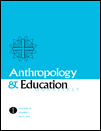
ANTHROPOLOGY & EDUCATION QUARTERLY
Connecting Cultures Through Educational ScholarshipANTHROPOLOGY & EDUCATION QUARTERLY, published by Wiley, is a premier journal dedicated to the exploration of the interconnections between anthropology and education. With an impressive impact factor and esteemed recognition as a Q1 journal in both Anthropology and Education, this journal ranks among the top in its fields, sitting at 62nd in Social Sciences - Anthropology and 478th in Social Sciences - Education according to Scopus. Since its inception in 1977, the journal has served as a vital platform for engaging research and scholarship, fostering dialogue among researchers, practitioners, and educators. While no open access options are currently available, the journal provides insightful articles that advance theoretical and practical knowledge, emphasizing the importance of anthropological perspectives in educational contexts. The journal is committed to connecting interdisciplinary scholars and contributing to the ongoing discourse that shapes the future of education and cultural understanding.

Revista Olhres
Empowering Educators with Cutting-Edge KnowledgeRevista Olhres, published by the Universidade Federal de São Paulo, Department of Education, is a leading journal dedicated to the exploration and advancement of knowledge in the field of education. With an ISSN of 2317-7853 and an E-ISSN of 2317-7853, this reputable journal has been available as an Open Access publication since 2013, making it accessible to a global audience of researchers, practitioners, and students. Positioned as a vital resource within the educational landscape, Revista Olhres aims to disseminate innovative research and foster vibrant discourse on practical and theoretical advancements in education, contributing to the ongoing professional development and academic inquiry within this dynamic field. By providing a platform for scholarly discussion and interdisciplinary collaboration, this journal plays a crucial role in shaping educational practices and policies in Brazil and beyond.

In Education
Exploring innovative ideas to transform learning.In Education is a prestigious open-access journal published by the Faculty of Education at the University of Regina, dedicated to advancing research in the field of education. With its ISSN 1927-6117, the journal has been a vital platform for scholarly work since 2009, providing a significant avenue for educators, researchers, and practitioners to share innovative ideas and research findings. Committed to fostering a rich dialogue on educational practices and policies, In Education publishes a diverse range of articles that cover theoretical and empirical research, ensuring a comprehensive exploration of contemporary educational issues. By encouraging open access, the journal promotes widespread dissemination of knowledge, facilitating greater accessibility for students and professionals alike. As a contributor to the evolving landscape of educational research, In Education serves as an essential resource for those aiming to transform educational practices through informed, evidence-based insights.

Departures in Critical Qualitative Research
Transforming Insights into Action in Social ResearchDepartures in Critical Qualitative Research, published by University of California Press, is an influential journal dedicated to advancing knowledge within the realms of Communication and Linguistics and Language. With its commitment to exploring the complexities and nuances of qualitative research, this journal has quickly established itself as a vital resource for scholars and professionals alike. Although it currently resides in the fourth quartile in Communication and the third quartile in Linguistics, its notable Scopus rankings, including a 64th percentile in Language and Linguistics, highlight its growing significance in the academic discourse. Covering a converged period from 2019 until 2024, the journal seeks to foster innovative and critical perspectives on qualitative methodologies, offering invaluable insights that address contemporary social issues. Access to its content is available to a wide audience, contributing to the journal's reputation as a beacon for those engaged in critical qualitative research.